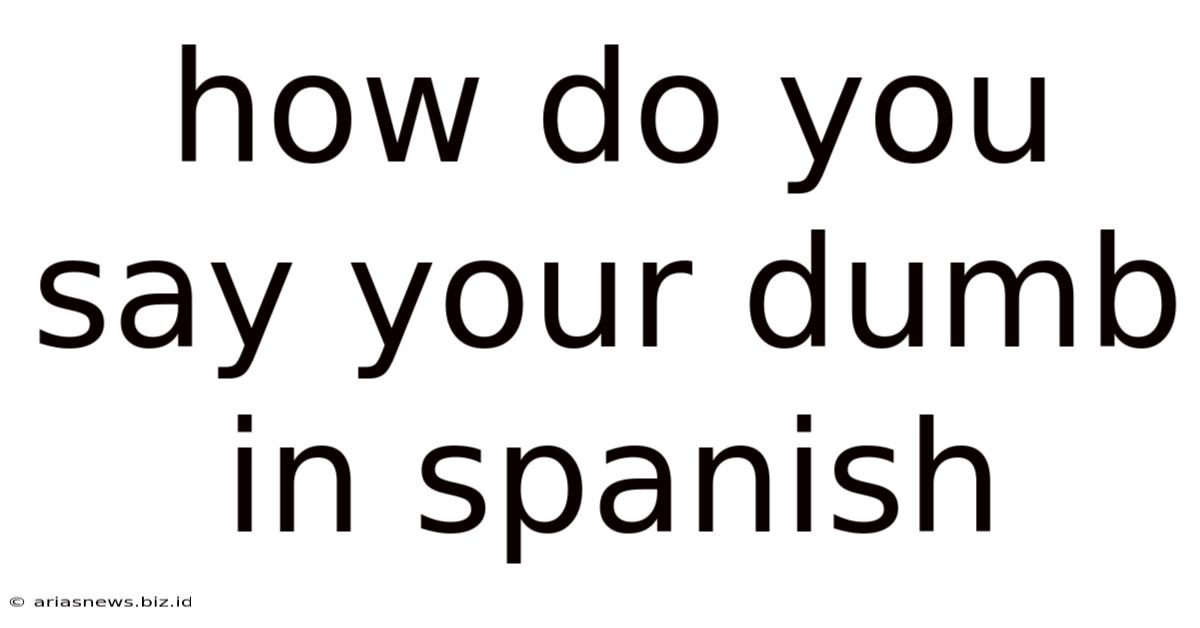How Do You Say Your Dumb In Spanish
Arias News
May 09, 2025 · 4 min read

Table of Contents
How Do You Say "You're Dumb" in Spanish? A Comprehensive Guide
Navigating the nuances of expressing negative opinions in a foreign language can be tricky. While a direct translation might seem straightforward, the cultural context and intended level of offense significantly impact the choice of words. This comprehensive guide explores various ways to say "you're dumb" in Spanish, from mild teasing to outright insults, helping you choose the most appropriate phrase depending on your situation and relationship with the person you're addressing. We'll also delve into the cultural implications of using such expressions, ensuring you communicate effectively and respectfully.
Understanding the Nuances of Insults in Spanish
Spanish, like any language, offers a wide spectrum of vocabulary to express disapproval. The choice of words hinges on several factors:
- Your relationship with the person: Saying something to a close friend differs vastly from addressing a stranger or someone in a position of authority.
- The context of the situation: A playful remark amongst friends is entirely different from a serious disagreement.
- The intended level of offense: Do you want to mildly tease, express strong disapproval, or outright insult someone?
Mild and Playful Expressions
These phrases are suitable for informal settings with close friends and imply a playful teasing rather than a serious insult.
1. Eres tonto/a (You're silly/foolish)
- Tonto is used for males, and tonta for females. This is a gentle way of saying someone is not very bright, often used affectionately among friends. It carries a lighthearted tone and avoids harshness.
2. Eres un/una bobo/a (You're a goofball)
Similar to tonto/a, bobo/a implies silliness or clumsiness. It's more playful and less judgmental, suitable for close friends.
3. Qué tontería! (What nonsense!) or ¡Qué bobada! (What a silly thing to say!)
These expressions don't directly call someone dumb but highlight the absurdity of their actions or words. They're less confrontational and focus on the action rather than the person's intelligence.
4. Estás loco/a (You're crazy!)
While technically not directly translating to "dumb," loco/a (crazy) is often used playfully to indicate someone's actions are unusual or illogical. The context is crucial here; it's usually used among close friends in a humorous way.
Stronger Expressions of Disapproval
These phrases are more direct and express stronger disapproval. Use them cautiously and only in appropriate contexts.
5. Eres un/una idiota (You're an idiot)
This is a more direct and harsher insult than tonto/a. It's highly offensive and should be avoided unless you are in an extremely informal setting with very close friends who understand the context.
6. Eres un/una imbécil (You're an imbecile)
Even stronger than idiota, imbécil is a severe insult and should be avoided in most social situations. It implies a significant lack of intelligence and is generally considered rude and disrespectful.
7. No tienes ni idea (You don't have a clue)
This phrase doesn't directly call someone dumb, but it strongly suggests a lack of understanding or knowledge. It's a more subtle way of expressing disapproval without resorting to direct insults.
8. Eres muy poco inteligente (You're not very intelligent)
A more formal and less offensive way of expressing a lack of intelligence. While still negative, it avoids the harshness of direct insults.
Regional Variations and Slang
The Spanish language boasts significant regional variations. Some phrases may be common in one region but considered rude or unusual in others. For instance, certain slang terms might be understood only within specific social groups. Always consider your audience and the specific region when selecting your phrasing. Researching common slang in the relevant Spanish-speaking region will aid in navigating these nuances.
Cultural Considerations: Respectful Communication
Remember that direct insults, even amongst close friends, can sometimes cause offense. Cultural norms vary greatly, and what might be acceptable in one culture could be highly offensive in another. Always consider the relationship you have with the person you're addressing and the overall context of your conversation.
Maintaining respectful communication is paramount, even when expressing disagreement or disapproval. Focusing on the specific action or behavior rather than attacking the person's inherent intelligence is a more constructive and less offensive approach.
Alternatives to Direct Insults
Instead of resorting to insults, consider these alternatives:
- Explain your perspective clearly and calmly. Focus on the facts and avoid emotional outbursts.
- Ask clarifying questions. Sometimes, a lack of understanding is at the root of the disagreement.
- Offer helpful suggestions or guidance. A constructive approach can be far more effective than an insult.
- Use humor (carefully). A well-placed joke can diffuse tension, but ensure your humor is appropriate and not offensive.
Conclusion: Choosing the Right Words
Choosing the appropriate way to express that someone is "dumb" in Spanish depends heavily on context, your relationship with the individual, and your desired level of directness. While a range of options exist, from playful teasing to harsh insults, the key is to use sensitivity and choose words appropriate for the situation. Consider the cultural context and opt for less direct or softer options whenever possible to foster respectful communication. Mastering this aspect of the language enriches communication, avoiding misunderstandings and fostering stronger relationships. Remember that conveying your message effectively often outweighs using a direct, potentially offensive term.
Latest Posts
Latest Posts
-
Someone Born In 1993 Is How Old
May 09, 2025
-
55 X 40 X 23 Cm To In
May 09, 2025
-
Which Was A Priority For Justinian I
May 09, 2025
-
How To Say God Is Good In Spanish
May 09, 2025
-
How Many Ounces Are In 2000 Ml
May 09, 2025
Related Post
Thank you for visiting our website which covers about How Do You Say Your Dumb In Spanish . We hope the information provided has been useful to you. Feel free to contact us if you have any questions or need further assistance. See you next time and don't miss to bookmark.